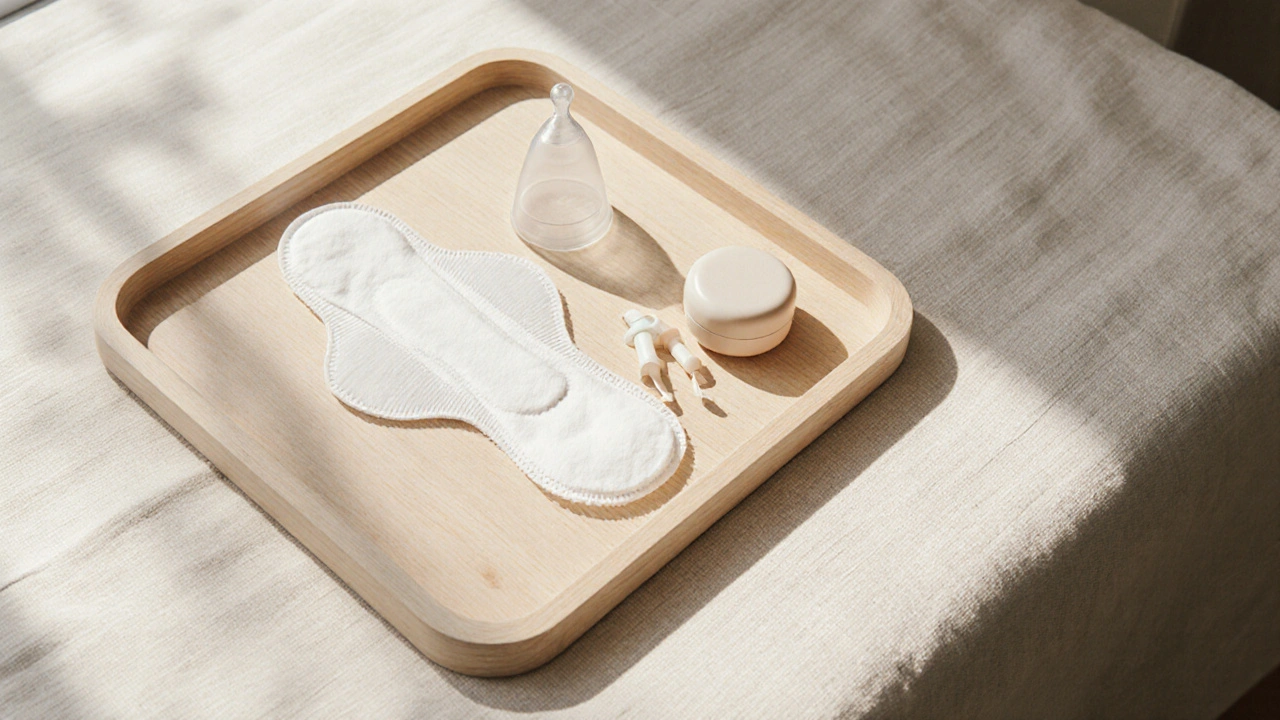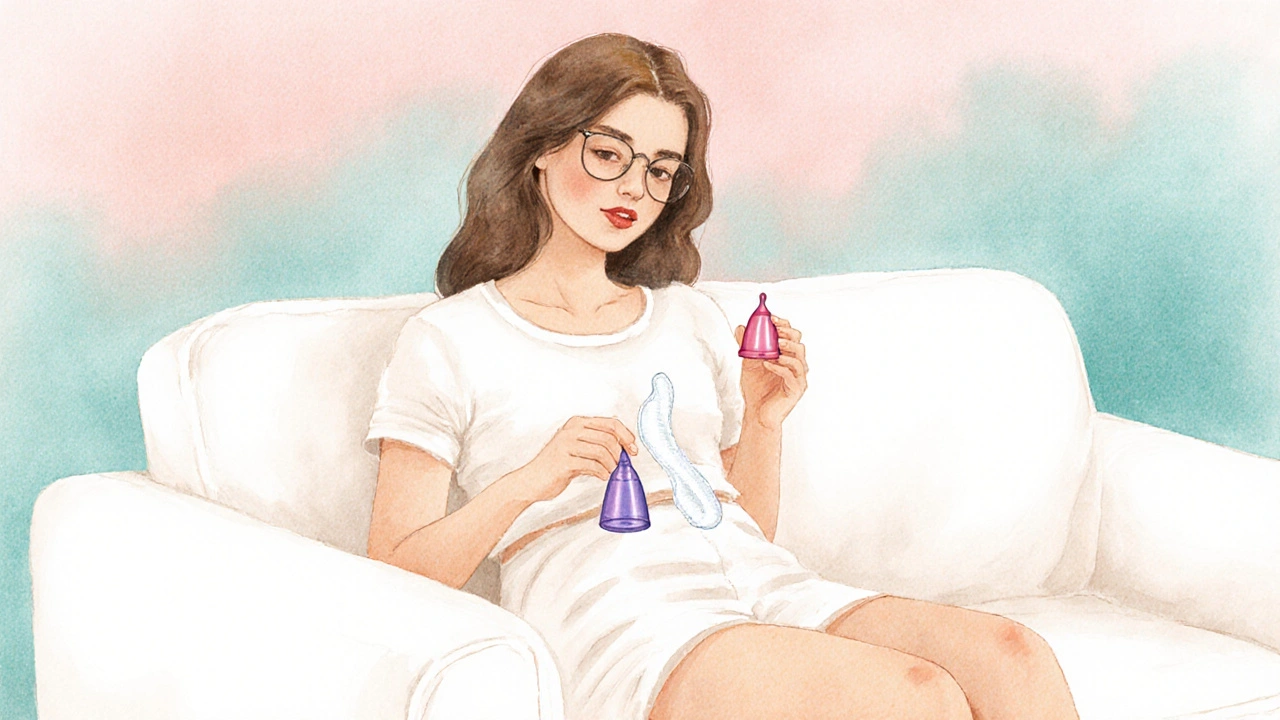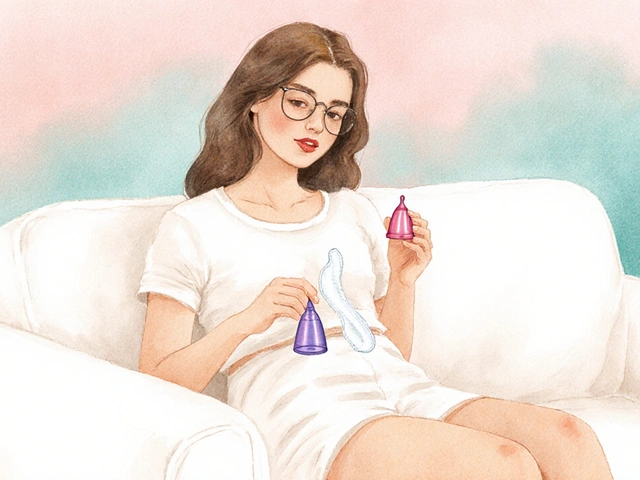Feminine Product Selector
Recommended Product:
Why This Choice?
Product Comparison:
| Product Type | Material | Breathability | Irritation Risk |
|---|---|---|---|
| Cotton Pantyliner | 100% Organic Cotton | High | Low |
| Disposable Pad | Synthetic + Cotton | Medium | Medium |
| Menstrual Cup | Medical-Grade Silicone | Excellent | Very Low |
| Organic Cotton Tampon | Certified Organic Cotton | High | Low |
Dealing with vaginal burning and constant irritation can feel like a never‑ending battle. The good news? The right feminine product can make a big difference, and you don’t need a medical degree to pick one that suits your body.
What’s Really Behind the Burning?
Before you shop, it helps to understand the usual suspects:
- Vaginal irritation caused by friction from tight clothing or synthetic fabrics.
- Disruptions to the natural pH balance - most healthy vaginas sit around a pH of 3.8 to 4.5.
- Allergic reactions to fragrances, dyes, or preservatives in soaps and pads.
- Common infections like yeast overgrowth or urinary tract infections (UTIs) that can mimic irritation.
If your symptoms linger more than a few days, or you notice unusual discharge, it’s wise to see a GP. But for everyday comfort, the products you choose play a starring role.
Key Features to Look for in Feminine Products
Not all products are created equal. Here are the attributes that matter most when you want to avoid or soothe that uncomfortable feeling:
- pH‑balanced - Look for the label ‘pH‑balanced’ or ‘vaginal‑friendly’. These formulas keep the environment close to its natural acidity.
- Fragrance‑free - Even a whiff of perfume can trigger a reaction.
- Hypoallergenic materials - Medical‑grade cotton, organic cotton, or silicone are gentler than synthetic blends.
- Breathability - Products that let air flow reduce moisture buildup, a common irritant.
- Absorbency level - Over‑absorbent pads can trap heat, while under‑absorbent ones can lead to leaks and friction.
Keeping these criteria in mind, let’s compare the most popular options.

Comparing Common Feminine Products
| Product Type | Material | Breathability | Irritation Risk | Best For |
|---|---|---|---|---|
| Cotton pantyliner | 100% organic cotton | High | Low | Light daily protection, sensitive skin |
| Disposable pad | Super‑absorbent polymer + cotton top layer | Medium | Medium (look for fragrance‑free) | Heavy flow days, overnight use |
| Menstrual cup | Medical‑grade silicone | Excellent (no surface contact) | Very low (if properly cleaned) | Long‑term wear, eco‑conscious users |
| Organic cotton tampon | Certified organic cotton | High | Low (fragrance‑free) | Active lifestyles, moderate flow |
How to Test a Product Before Fully Switching
Even the best‑rated item might not click with your unique chemistry. Try this low‑risk trial method:
- Pick a small batch or single‑pack of the product you’re curious about.
- Use it for one day or one menstrual cycle, noting any change in comfort, itching, or vaginal burning.
- If irritation spikes, stop immediately and revert to a known‑good product.
- If you feel neutral or improved, you’ve likely found a match.
Keep a simple diary - date, product, symptoms - to spot patterns over weeks.
When to Call a Doctor
Products can soothe, but they can’t cure an infection. Seek medical advice if you notice:
- Persistent burning lasting more than three days.
- Thick, white discharge or a fishy odor - signs of yeast or bacterial vaginosis.
- Painful urination, fever, or pelvic pain.
- Bleeding between periods.
Your GP may prescribe a topical cream, an oral antifungal, or a targeted probiotic regimen.

Everyday Habits to Keep Irritation at Bay
Beyond products, daily choices matter a lot:
- Swap tight leggings for breathable cotton underwear.
- Rinse with warm water only; avoid scented washes.
- Pat dry gently after showering - moisture is a breeding ground for irritation.
- Consider a probiotic supplement with Lactobacillus rhamnosus to support vaginal flora.
- Stay hydrated; urine that’s too concentrated can increase UTI risk.
Quick Takeaways
- Choose pH‑balanced, fragrance‑free, and hypoallergenic products.
- Organic cotton liners and silicone menstrual cups score lowest on irritation risk.
- Test new items for a few cycles and keep a symptom log.
- Seek professional care if burning persists or is accompanied by unusual discharge.
- Healthy habits (breathable fabrics, proper hygiene) reinforce product benefits.
Frequently Asked Questions
Can tampons cause vaginal burning?
Tampons made from synthetic fibers or scented additives can disturb the natural pH and cause irritation. Switching to 100% organic cotton tampons often reduces burning.
Are reusable pads better for sensitive skin?
Yes, if they’re made from breathable cotton or bamboo and washed without harsh detergents. They eliminate chemicals found in disposable pads.
How often should I replace a menstrual cup?
Most manufacturers recommend replacing a silicone cup every 1-2 years, depending on wear and cleaning habits.
Is witch hazel safe for everyday use?
Witch hazel can calm mild irritation, but avoid products with added alcohol or fragrance, as they may worsen burning over time.
When should I consider a probiotic wash?
If you frequently experience yeast overgrowth or after a course of antibiotics, a probiotic‑infused wash can help restore balance, but it should complement- not replace-medical treatment.


While the guide outlines admirable criteria, one must recognize that vaginal burning often stems from factors beyond the immediate choice of a pad or cup. Hormonal fluctuations, residual soap residues, and even stress can precipitate discomfort regardless of material quality. Its easy to overlook systemic issues when focusing solely on product specifications, and that tunnel vision may delay proper treatment.
Indeed, a comprehensive approach that combines suitable products with lifestyle adjustments tends to yield the most lasting relief. Opting for fragrance‑free, pH‑balanced items is a solid start, but pairing them with breathable cotton underwear and gentle cleansing habits amplifies the benefit. Remember, each body is unique, so monitoring responses and adjusting accordingly is key.
The experience of vaginal burning invites a contemplation of the intricate symbiosis between microbiota and host tissue.
When one considers that Lactobacillus species maintain an acidic milieu, the importance of preserving this balance becomes evident.
Products that introduce synthetic polymers or scented additives risk perturbing this delicate equilibrium, potentially inviting opportunistic pathogens.
Consequently, the selection of hypoallergenic, breathable materials is not merely a matter of comfort but a strategic intervention in microbial stewardship.
Moreover, the psychosocial dimension-stress, anxiety, and even cultural narratives about feminine hygiene-exerts measurable influence on neuroendocrine pathways that regulate inflammation.
In this light, any recommendation that isolates the product from the broader physiological context may inadvertently simplify a multifactorial phenomenon.
Empirical studies have demonstrated that regular use of medical‑grade silicone menstrual cups, when properly sterilized, correlates with lower rates of irritant dermatitis.
Likewise, organic cotton liners have shown minimal disruption of the vaginal pH, thereby supporting the resident lactobacilli.
Yet, the clinician’s counsel must extend beyond the shelf, encouraging patients to log symptoms, fluid intake, and dietary factors.
Such longitudinal self‑monitoring facilitates pattern recognition that can differentiate transient irritation from emerging infection.
If the burning persists beyond a few days despite optimized product choice, the prudent course is to seek medical evaluation to rule out candida, bacterial vaginosis, or urinary tract involvement.
Treatment modalities, ranging from topical azoles to probiotic supplementation, should be tailored to the identified etiology.
Furthermore, education about proper insertion techniques for cups or tampons can prevent mechanical trauma, another common source of discomfort.
The holistic paradigm thus intertwines product selection, behavioral modifications, and timely clinical intervention.
By adopting this comprehensive strategy, individuals can reclaim comfort while honoring the complexity of their own biological narratives.
Ultimately, the goal is not merely to mask symptoms but to foster an environment in which the body can maintain its innate resilience.
It is imperative to note that the term “pH‑balanced” denotes a product whose acidity aligns with the typical vaginal range of 3.8 to 4.5, thereby supporting the native flora rather than disrupting it.
Thank you for emphasizing that nuance; adhering to pH‑balanced options indeed serves as a cornerstone of vaginal health. Coupling this with gentle cleansing and breathable underwear can dramatically reduce irritation.
👍
Choosing the correct feminine product is a decisive step, and it can transform daily comfort-especially when you prioritize fragrance‑free, breathable cotton liners, or a well‑maintained silicone cup; remember, consistency is key, and proper hygiene amplifies results!
Yo man, I cant stress enough how much a lil drama in the bathroom can mess your vibe-if u keep using scented pads, ur burning gonna feel like a tiny inferno. Switch to plain cotton, and u’ll feel like a phoenix rising from ash!
From a product development standpoint, the segmentation of feminine hygiene solutions hinges on variables such as absorbency index, material biocompatibility, and user‑reported irritation scores, which collectively inform the design of low‑risk, high‑performance offerings.